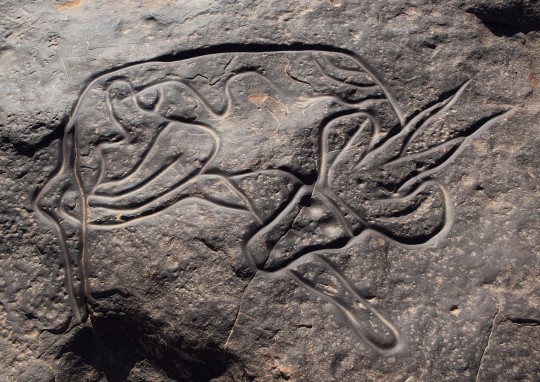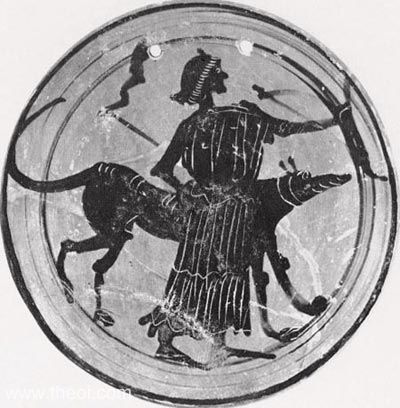Don't wanna be here? Send us removal request.
Photo

Jerboa figurine ca. 1850–1640 B.C. Middle Kingdom, Egypt
2K notes
·
View notes
Photo

A beautiful Mesolithic amber figure of a bear. It washed up on a beach at Fanø in Denmark from a submerged Mesolithic settlement under the North Sea. 12,500-3,900 BCE, now on display at the National Museum of Denmark.
14K notes
·
View notes
Text




Spring-fresco from Akrotiri (Thera) 16th century BCE as seen in the Heraklion Museum Athens
license source source source source
370 notes
·
View notes
Text

An owl (Athene noctua), the sacred bird of Goddess Athena || Acropolis Museum, Athens, Greece. Photo by Stella Sapounakis.
2K notes
·
View notes
Photo

Beautifully-observed & realistic figure of a sleeping Antelope incised on rock up to 10,000 years ago at Tin Taghirt, Tassili n'Ajjer in Algeria, one of the largest & most important groupings of prehistoric cave art in the world.
ph: Linus Wolf
34K notes
·
View notes
Photo



Didrachm (reverse) - 8.6 grams silver - Eretria, Greece - 500-480 BCE
Tetradrachm - 17.2 grams silver - Eretria, Greece - 500-490 BCE
Litra - .87 grams silver - Syracuse, Sicily - 460-450 BCE
Socrates (Greek, 469–399 BCE) could have handled any of these coins and asked why they depicted an octopus — or what values they represented …
In the 5th century BCE the value of a litra was equivalent to the value of a pound of bronze, while the value of a didrachm (two drachmas) was considered to be about the value of two days wages for the average worker in antiquity.
The current (July 2020) value of bronze is $1.37 per pound, and value of silver is $206.51 per pound, or 45½ cents per gram. A pound is 453.592 grams.
714 notes
·
View notes
Photo

The Hinds of Chaffaud, found in the Grotte de Chaffaud (Savigné, Vienne, Nouvelle-Aquitaine). It is from the Upper Paleolithic Period, made from a reindeer foot-bone, and is 13.2cm in length.
This engraving is of two hinds (female deer), with very precise details of the heads. The almond-shaped left eye is emphasized with fine hatching. A sign depicting a wing is engraved in front of the hooves of each hind, but its meaning is unknown.
630 notes
·
View notes
Photo

Hecate, Athenian black-figure kylix C6th B.C., Museum der Universität Tübingen
776 notes
·
View notes
Photo
South Italian
oil flask

Apulian Frog Guttus, 4th century BC, Cleveland Museum of Art: Greek and Roman Art
Size: Diameter: 1.5 cm (9/16 in.); Overall: 5.8 x 11.2 x 9.1 cm (2 5/16 x 4 7/16 x 3 9/16 in.) Medium: pottery with black slip and added white
https://clevelandart.org/art/1985.176
67 notes
·
View notes
Photo
Etruscan

Alabastron (perfume vase) in the shape of a hare. c. 600 - 550 B.C.; terracotta. The Metropolitan Museum of Art.
161 notes
·
View notes
Text
Went looking for more pictures of animal ceramics from the area of czech republic and let me tell you... i am not disappointed

From the area of Pilsen-Radčice, ceramic zoomorph vessel, hallstatt urnfield culture (800-560BC)
absolutely amazing
916 notes
·
View notes
Photo
“Pottery models of houses and farm structures were commonly included in Eastern Han burials to provide for the afterlife.”
China

Square Duck Pond, 1st–early 3rd century, Metropolitan Museum of Art: Asian Art
Charlotte C. and John C. Weber Collection, Gift of Charlotte C. and John C. Weber, 1994 Size: H. 2 ¾ in. (7 cm); D. 12 in. (30.5 cm) Medium: Earthenware with green lead glaze
https://www.metmuseum.org/art/collection/search/44326
521 notes
·
View notes
Photo
Italy, Pompeii, Roman, 1st Century CE

Griffin Atop Entablature, 1-100, Cleveland Museum of Art: Greek and Roman Art
Size: Overall: 37.2 x 44.1 cm (14 5/8 x 17 3/8 in.) Medium: fresco fragment
https://clevelandart.org/art/1981.20
17 notes
·
View notes
Photo

Artist’s Sketch of a Swallow, New Kingdom, ca. 1479–1458 B.C. metmuseum.org
5K notes
·
View notes
Photo

Roman fresco. Pompeii, Casa del Bracciale d'Oro
11K notes
·
View notes
Photo

A larnax, or chest, made to contain human remains, from Crete.
Credit…New York District Attorney’s Office
243 notes
·
View notes

